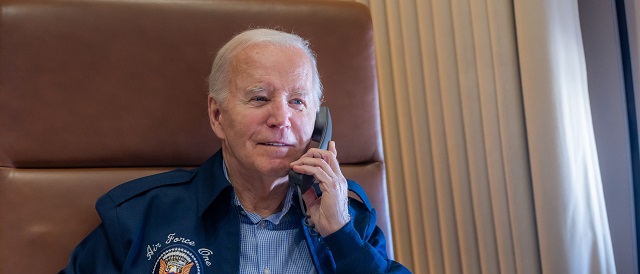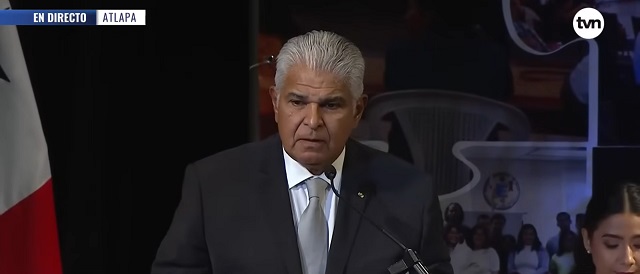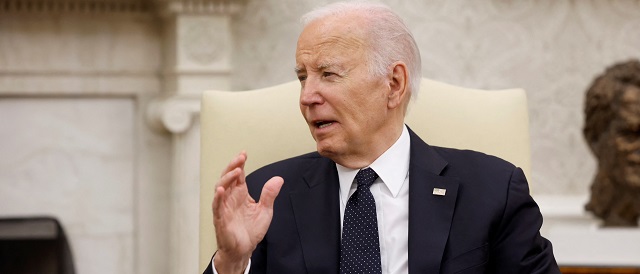conflict
Columbia on Lockdown After pro-Palestinian Protesters Take Over Building, Hold Janitors Hostage

From Heartland Daily News
Columbia University locked down its campus Tuesday to everyone but essential personnel and students after anti-Israel protesters smashed windows and barricaded themselves inside Hamilton Hall early in the morning.
A staff member in the building at the time said he was temporarily taken hostage, The Columbia Spectator reports.
As of 9 a.m. Tuesday, the New York university even barred the media from campus “as a safety measure,” a news update states.
“Access to campus has been limited to students residing in residential buildings on campus and employees who provide essential services to campus buildings, labs, and residential student life,” according to the announcement.
The Spectator reports more:
The [lock down] comes six hours after around three dozen protesters occupied Hamilton Hall, pledging to remain inside the building until the University meets its stated demands, including divestment from Israel, financial transparency, and amnesty for students detained and suspended in the mass arrests on April 18.
Protesters sealed off the building minutes after entry, barricading the doors with wooden tables, chairs, and zip ties. Demonstrators outside moved the metal tables outside Hartley Hall to the front of the doors, securing them shut with ropes and zip ties.
A facilities worker said he was temporarily held hostage but allowed to leave about 10 minutes later, according to the student newspaper. Later, two other janitors said they also were temporarily held hostage, according to Fox News.
Columbia has fallen
Pro-Palestinian protesters have reportedly taken a building by force and barricaded themselves inpic.twitter.com/fhFbOmZVwY
— The College Fix (@CollegeFix) April 30, 2024
Several students also reported being assaulted by protesters trying to enter the building, according to an X video by freelance reporter Jessica Schwalb.
Student is assaulted by mob. @NYPDDaughtry Many students have called the police but where are you???
We are in danger. pic.twitter.com/ghZWuMgb6y
— Jessica Schwalb (@jessicaschwalb7) April 30, 2024
Pro-Palestinian protests have been going on for weeks at Columbia, with some demonstrators establishing a “Gaza Solidarity Encampment” on the lawn.
On Monday, university spokesperson Ben Chang said students began receiving suspension notices after ignoring repeated warnings to leave their encampment by 2 p.m. that day.
“Students who agreed to leave and sign a form committing to abide by University policies will be allowed to complete the semester,” Chang said in a campus update.
Some faculty members, many of them wearing masks, joined the protesters just ahead of the 2 p.m. deadline, locking arms to form a human chain around the encampment, according to videos on X.
Unbelievable. Columbia faculty lock arms to prevent police from clearing the encampment. Why do they still have jobs? pic.twitter.com/XrKlNCOx3q
— Ian Miles Cheong (@stillgray) April 29, 2024
As of Tuesday morning, the pro-Palestinian demonstrators continue to occupy the building. The Spectator reports New York Police Department officers have been at the scene since about 12:45 a.m. but have not entered the building.
conflict
‘It Makes No Sense’: Experts Puzzled By Biden Admin’s Claim That Rafah Invasion Wouldn’t Help Israel Defeat Hamas

 From the Daily Caller News Foundation
From the Daily Caller News Foundation
By JAKE SMITH
The Biden administration’s claim that an Israeli invasion into Rafah would not help the nation defeat Hamas or secure a hostage release deal “makes no logical sense,” several experts told the Daily Caller News Foundation.
White House national security spokesman John Kirby said on Thursday that Israel cannot achieve a “sustainable and enduring defeat” against Hamas by invading Rafah, also claiming that it could jeopardize ongoing negotiations to free the hostages in Gaza. Experts told the DCNF that the claim doesn’t hold water as a military operation is the only way to pressure Hamas into reaching a hostage deal and eventually achieve victory over the terror group.
“An enduring defeat of Hamas certainly remains the Israeli goal, and we share that goal with them,” Kirby said. “Smashing into Rafah, in [Biden’s] view, will not advance that objective, will not get to that sustainable and enduring defeat of Hamas.”
Two high-level defense experts and a former senior U.S. official told the DCNF that Kirby is mistaken and that the only way to ensure Hamas is defeated is through military operations.
“Kirby is wrong,” Mark Dubowitz, CEO of the Foundation for Defense of Democracies (FDD), a Washington-based defense think tank, told the DCNF. “Only the Israel Defense Force’s (IDF) patient, well-planned and well-executed operation has been successful in smashing Hamas and releasing hostages, to date.”
“You can’t defeat Hamas with good vibes and nice words. You defeat them on the battlefield through munitions, through kinetic action,” Executive Director of Polaris National Security and former State Department official Gabriel Noronha told the DCNF.
Kirby and State Department spokesperson Matthew Miller have said that the administration believes if Israel chooses to push into Rafah, it will weaken their hand in negotiations to secure a deal to release the hostages currently held in Hamas captivity. Israel has been negotiating with Hamas through international meditators, including the U.S., for months to reach a deal that would see a temporary ceasefire in the Gaza region in exchange for their release.
“We actually think that a Rafah operation would weaken Israel’s position, both in these talks and writ large,” Miller said on May 9.
“If I’m Mr. Sinwar, and I’m sitting down in my tunnel … and I’m seeing innocent people falling victim to major significant combat operations in Rafah, then I have less of an incentive to want to come to the negotiating table,” Kirby told reporters, referring to Yahya Sinwar, the leader of the military branch of Hamas.
Hamas is unlikely to be more inclined to move the hostage deal along if Israel doesn’t invade Rafah as the terrorist group isn’t concerned with the wellbeing of Palestinians in the region, experts told the DCNF. The IDF has accused the terrorist group of using civilians as human shields and embedding itself within population centers.
“It’s preposterous. It stands in the face of all the evidence we’ve actually seen in this conversation,” Noronha told the DCNF. “There’s been nothing that the White House has released that makes room for any kind of justification for what they’re claiming from the podium.”
The lack of military pressure from Israel would make Hamas less incentivized to reach a hostage and ceasefire deal, Shoshana Bryen, defense analyst and senior director of The Jewish Policy Center, told the DCNF. Hamas agreed to one ceasefire deal in November after coming under intense stress from Israeli forces, but the deal quickly fell apart in December.
“The only serious negotiating Hamas did was in the very early days when Israel’s fury was evident and accepted by most of the world,” Byren told the DCNF. “Hamas leadership saw that it might be defeated on the battlefield, so it permitted a ceasefire and released hostages. Since that time, the Biden administration has worked to constrain Israel — up to and including the withholding of arms approved by Congress.”
“Hamas isn’t stupid. As long as the Biden administration works to constrain Israel, Hamas doesn’t have to give anything,” Byren said.
Experts who spoke to the DCNF also took issue with Kirby claiming that Israel does not need to push into Rafah because Hamas has largely been crippled by Israeli forces since Oct. 7.
“It’s like saying, ‘Oh, we did chemotherapy for a month. We got 80% of the cancer, we’re good to go. We’ll just leave now.’ Again, it makes no sense,” Noronha told the DCNF.
“When someone announces that they want to kill you, they train to kill you, they arm to kill you, they teach their children that if the adults don’t finish the job in this generation, the children are expected to do it in the next generation,” Bryen told the DCNF. “When they say, ‘100 October 7s,’ they’re not kidding.”
Israeli forces seized control of the Rafah crossing bordering Egypt on Tuesday, saying that it was a vital chokepoint to stop the flow of weapons into Gaza, according to The Wall Street Journal. The IDF is moving further into the eastern corridors of Rafah, but has not yet gone into Rafah city, where the bulk of the more than one million refugees are located, according to The Associated Press.
Biden said during a CNN interview on Wednesday that the administration has not seen Israel cross a line in Rafah, but warned of consequences, including halting military aid, if Israel launches a full-scale invasion.
“If Israel had listened to the White House [since the war began], 18 Hamas terrorist battalions would still be standing, dozens of senior Hamas terrorist leaders would still be alive directing terror operations, dozens of Israeli and foreign hostages would still be languishing in the helm of Hamas captivity and Hamas would still be in charge planning the next October 7,” Dubowitz told the DCNF. “The Biden administration’s pressure on Israel has only prolonged the war and the suffering on both sides.”
conflict
America Is Really Bad At Foreign Interventions. Why Does Biden Think Ukraine Will Be Any Different?

 From the Daily Caller News Foundation
From the Daily Caller News Foundation
One of the very first operations undertaken by the Central Intelligence Agency (CIA) after its founding in 1947 was to create an army to fight the Soviets in Ukraine. Dubbed Operation Nightingale, the CIA aimed to reconstitute Nazi death squads in Ukraine that the Germans called Nachtigall.
The newly created U.S. intelligence community figured we’d partnered with communists to destroy fascism. Now, post war, we could team with the fascists to destroy communism.
Unsurprisingly, Nightingale was a spectacular failure. The Kremlin’s spies discovered every aspect of the plan well before it was initiated.
In its early years, the CIA lurched from one fiasco to another. On Sept. 20, 1949, CIA analysts declared the Soviet Union would not produce a nuclear weapon for at least another four years. Three days later, Truman had to tell the country that Russia had the bomb.
Sadly, things are hardly better today.
In 2021, U.S. intelligence agencies looked into their crystal ball and told senior congressional leaders that Afghanistan’s national security forces could keep the Taliban at bay for a year or perhaps longer. The Taliban took Kabul in a matter of hours.
“Clearly we didn’t get things right” on that intelligence, National Security Council spokesman John Kirby dryly remarked later.
The next year, U.S. intelligence took the opposite tack on Ukraine, predicting the capital, Kiev, might fall within days of Russia’s 2022 invasion. Two years in, Kiev is still in the Ukraine column.
Bonehead analysts even offered to evacuate Volodymyr Zelensky — evidently having learned nothing from the disastrous U.S. evacuation of Afghan President Ashraf Ghani.
What did they get right? Avril Haynes, the Director of National Intelligence, applauded her agency for correctly predicting that Russia planned to invade Ukraine. “We assess President Putin is prepared for prolonged conflict,” she testified in May 2022. You don’t say? The 100,000 troops Putin amassed on Ukraine’s border were likely a helpful clue.
Many in our intelligence community scoffed at Putin’s criticism of America’s heavy hand in Ukraine. Those who dared point out that the CIA had injected former Nazis into Ukraine after World War II were labeled stooges of Russian disinformation. They’d prefer we not recall the U.S.’s more provocative recent history in Ukraine, much of it based on bad American intelligence.
During Ukraine’s Maidan demonstrations in 2013, U.S. officials, including then-Vice President Joe Biden, saw an opportunity to fulfill the predictions of President Jimmy Carter’s national security advisor, Zbigniew Brzezinski, who postulated that “without Ukraine, Russia ceases to be a Eurasian empire.”
By pulling Ukraine closer to Europe, NATO and the U.S., they reasoned we could de-claw the Russian bear. Thus, the U.S. supported ousting the democratically-elected Ukraine president, Viktor Yanukovych. Victoria Nuland, Obama’s Assistant Secretary of State for European and Eurasian Affairs, boasted that the United States had “invested” $5 billion to build Ukraine’s credentials to join the European Union.
She passed out actual cookies during the coup. Nuland was later caught on tape plotting who would be Ukraine’s post-coup president and getting Joe Biden to give an “attaboy” that would “F**k the EU” for not being aggressive enough with Moscow.
On cue, Biden endorsed Ukraine’s uprising: “Nothing would have greater impact for securing our interests.” Yanukovych was ousted and in the months that followed, Nuland pushed the U.S. to arm Ukraine and carefully crafted the media message, “I would like to urge you to use the word ‘defensive system’ to describe what we would be delivering against Putin’s offensive systems.”
If Nuland’s regime-change playbook sounds familiar, stop a moment and ponder that her resume also includes serving as Vice President Dick Cheney’s principal deputy national security advisor. Her husband, Robert Kagan, was among the chief proponents of America’s swell idea to bring democracy and stability to Iraq by toppling Saddam Hussein.
Other U.S. players meddled in Ukraine as well. On April 12th, 2014, CIA Director John Brennan secretly visited Ukraine, kicking off a new covert war with Russia. In a recent report by The New York Times, turns out the CIA has operated a dozen secret bases in Ukraine since his visit. Little wonder Brennan feared a Trump victory.
Trump’s surprising win in 2016 undermined all this maneuvering. “I really hope that you and President Putin can get together and solve your problem,” Trump told Zelenskyy. “That would be a tremendous achievement.” Trump lowered the temperature, but pausing weapons delivery to Ukraine became the root cause of his first impeachment.
Within six weeks of taking office, the Biden administration cranked up aid to Ukraine, delivering $125 million in March 2021. As of two weeks ago, that figure now tops $185 billion.
America holds a long list of failed interventions based on bad intelligence: Afghanistan, Libya, Iraq, Panama, Haiti, Serbia, Grenada, Iran, South Vietnam, Congo, Cuba, Guatemala, Albania and the Dominican Republic, among others.
It doesn’t take an intelligence genius to predict the ultimate outcome of our latest dalliance in Ukraine.
Morgan Murphy is a former DoD press secretary, national security adviser in the U.S. Senate, a veteran of Afghanistan.
The views and opinions expressed in this commentary are those of the author and do not reflect the official position of the Daily Caller News Foundation.
-

 COVID-192 days ago
COVID-192 days agoFormer COVID coordinator Deborah Birx now admits jabs could have injured ‘thousands’
-

 Opinion2 days ago
Opinion2 days agoCanada’s fertility, marriage rates plummet to record lows: report
-

 Uncategorized1 day ago
Uncategorized1 day agoRCMP recruitment failure has Alberta advocacy group calling for Provincial Police Service
-

 Health24 hours ago
Health24 hours agoPrivate Footage Reveals Leading Medical Org’s Efforts To ‘Normalize’ Gender Ideology
-

 Alberta23 hours ago
Alberta23 hours agoRed Deer Hospital Lottery – Second Chance Early Bird Prize!!!
-

 armed forces23 hours ago
armed forces23 hours agoTrudeau government has spent $10 million promoting DEI in the military as recruitment flounders
-

 illegal immigration2 days ago
illegal immigration2 days agoPanama’s Incoming President Wants To Shut Down His Country’s Most Treacherous Route For Migrants — But Will It Work?
-

 COVID-1922 hours ago
COVID-1922 hours agoMore victories for freedom as ArriveCAN charges dropped and fines reduced








